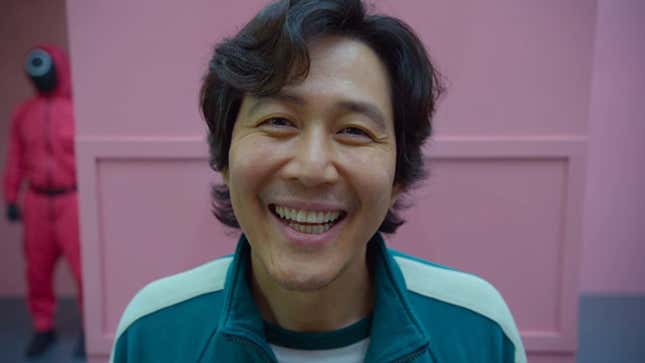
There’s a scene near the start of the first episode of Korean Netflix phenomenon Squid Game where main character, Seong Gi-hun, is repeatedly trying and failing to get a prize from a claw machine. He’s just been beaten up, lost gambling winnings he’d only possessed for a few minutes, and he’s trying to win a last-ditch birthday present for his daughter. It is a moment that’s emblematic of everything Squid Game wants to say.
It’s a joy to see a subtitled Korean horror TV program be the number one show on Netflix in the U.S. As anyone who’s watched will tell you, Squid Game is an extraordinary creation, far more than the “Battle Royale-lite” its trailers implied. It’s one of the most bitingly satirical commentaries on 21st century urban poverty as you’re likely to see, presented as if Wes Anderson remade Audition. It also closes the loop on a circle that began with the 2000 movie Battle Royale then somehow reached Fortnite.
For the avoidance of doubt, spoilers for Squid Game lie ahead. While I won’t discuss anything specific that happens after the first episode, a great deal of what the show’s about will be a spoiled surprise for anyone coming in fresh from the trailer. This is an incredibly good program, and if you’re good with excessively bloody violence, go watch it now.

The series, while featuring hundreds of characters, focuses primarily on one man: Seong Gi-hun of Ssangmun-dong (as he introduces himself), who is a superbly complicated character. He’s an absolute bum, divorced father of one, living with and off his elderly mother, stealing from her to gamble. He gets his daughter a birthday present by getting another kid to win him something from a claw machine, then takes her out for the cheapest fast food. He steals his mother’s credit card to drain her account. He runs from—and lies, begs and grovels to—his thug creditors. And yet, as he does it all, he’s so likeable. That’s in large part thanks to Jung-jae Lee’s superb portrayal, flipping instantaneously between congenial goofy grins and furious spittle-flecked outbursts. But it’s also thanks to truth in the writing, that people who just endlessly fuck up can be capable of moments of decency, too.
Gi-hun is eventually approached by a smartly-dressed and strikingly handsome man on the metro, offering to pay him huge amounts of money for winning at a Korean kids game, Ddakji. It’s about throwing a folded piece of paper at the opponent’s piece, lying on the floor. If you can flip it, you win the round. (Think origami Pogs.) If he wins a round, he gets 100,000 won ($84), if he loses, he gets slapped around the face. Once he’s badly bruised but with a fistful of cash, he’s given a card, and told to call if he wants to win more money playing more games. He’s the 456th person to be invited, it turns out.

Of course he calls. He’s so in debt, has spent all his ailing mother’s money, is loathed by his ex-wife and her new partner, and has nowhere else to turn. He has far less than nothing, and lacks the wit or skill to find any other way out of it. It is, as the Squid Game’s coordinators are so keen to point out, always his choice. But it’s also no choice at all.
After being gassed to sleep in the back of the car sent to pick him up, he wakes to find himself in a co-ed dormitory, bunkbeds five storeys high, with the other 455 players, disorientated and immediately thrown into their first game: Red Light, Green Light.
It’s pretty similar to the playground version, just rather than being ‘out’ if you move when looked at, you’re shot dead.
By the end of the first episode, it becomes very clear that there is an awful lot more to Squid Game than wacky deaths. This is first and foremost a program about poverty, and while it’s specifically South Korean poverty, it’s broadly applicable everywhere. Where BR was about so-called “delinquent” children in the hands of a totalitarian government, SG requires no such leap into a fictionalised near-future to justify its premise. It’s a show about the desperation born of hopelessness that comes with insurmountable debt. So, yes, despiteSquid Game’s striking colors, extraordinary sets, and game show-like quality, this is not a comedy. It’s often funny, but if there’s any mood that permeates its creation, it’s anger.

Obviously game show formats as punishment/vindication isn’t a fresh idea. Stephen King’s The Running Man was first published in 1982, and the rather loosely adapted Schwarzenegger movie came out in ‘87. That was long preceded by Das Millionenspiel, a German TV movie from 1970 in which contestants must go on the run from gangland murderers to win a million marks. But even that was based on the 1958 book The Prize Of Peril by Robert Sheckley. This isn’t new territory, is the point. Certainly both Battle Royale and Squid Game don’t have the studio or viewing audiences, but they’re replaced by the much more modern concept of surveillance, their every move being watched by a faceless (literally, with SG’s masks) army.
Something that marks Squid Game’s approach to the game show elements as different from all that came before is the videogame-like aspect to so much of what happens. The numbers of players currently playing is always displayed on a large scoreboard in the dormitory, along with the available prize money beneath it. By episode four it’s reached 34 billion won ($28 million).) These numbers tick around with the chimes of an arcade, while so many details in the show are illustrated and scored with videogame-like aesthetics. And it’s not a coincidence that the entire project (both in-fiction and in its outward presentation) uses the motif of a square, triangle and circle, three-quarters of Sony’s trademark, the X presumably omitted to avoid a lawsuit.

What follows is far more complex and nuanced than the single-concept show it could easily have been. We delve into the lives of so many of these characters, gaining an understanding for why they might agree to a series of deadly games, just for a miniscule chance of financial support. Certainly, as the episodes run on, it does fall back on somewhat less sober explanations for what’s going on, but it unquestionably nails the landing by the time it’s done.
The games they play are based on childhood games from Korea, some universal, some very much not so. Even if they’re not familiar, they all make instant sense. We all played games as children, we know the logic, the rules. Which is, you may have noticed, very much the direction multiplayer gaming has headed ever since the boom of the battle royale genre. Not least when coupled with the garishly colored and whimsical sets. Think especially of Fall Guys, of Gang Beats, of Pummel Party. Think the various events that have happened in Fortnite (Live at Riskey, Cosmic Summer...), and of course Among Us, the distillation of everything from hide-and-seek to Mafia.. These are playground games as adult entertainment, yet fiercely competitive, sometimes brutally violent.

In the program, this is combined with a strong presence of gacha. The claw machine scene—and its follow-up when his daughter finds the grimly inappropriate gift inside what he wins—that foreshadows the entire premise of Squid Game. Unfair, childish games, voluntarily entered into, for prizes you might not want, never worth the cost of playing. It feels appropriate to contrive it as a warning for video games, as well as its more deliberately stark prophetic allegory for torn societies.
Squid Game undeniably delivers on the explosive gore on which it’s sold. It’s fantastic, disgusting, and will make you duck behind your arms. However, what’s more extraordinary is that its unflinching, furious commentary on the growing worldwide divide between the rich and poor is by far the more gruesome element.

